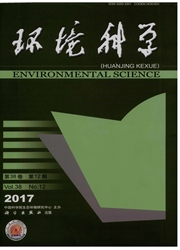

 中文摘要:
中文摘要:
以啤酒废水为底物,采用空气阴极微生物燃料电池,加入50 mmol/L磷酸盐(PBS)作为缓冲溶液,考察了20℃和30℃下,MFC产电性能及生物相变化.当环境温度从30℃降低到20℃时,MFC最大输出功率从483 mW/m^2降低到435 mW/m^2,库伦效率和COD去除率变化不大.温度对阴阳两极的电位均有影响,且对阴极的影响大于对阳极的影响.以莫诺德方程对实验数据进行拟合,得到半饱和速率常数Ks分别为228 mg/L(30℃)和293 mg/L(20℃).变性梯度凝胶电泳(DGGE)图谱表明,温度变化不仅影响了阳极的优势菌群,而且对阴极微生物种类具有很大的影响.
 英文摘要:
英文摘要:
The effects of temperature on performance and biological community structure were investigated in air-cathode microbial fuel cells (MFCs) using beer wastewater amended with 50 mmol/L phosphate buffer solution (PBS). The maximum power density decreased from 483 mW/m^2 to 435 mW/m^2 when the temperature varied from 30℃ to 20℃, meanwhile just a little decreasing on coulombic efficiency and the COD removal rate were observed. Decreasing of temperature resulted in effects both on cathode potential and anode potential, but cathode potential behaved much more sensitive to temperature. The half-saturation constants ( Ks ) obtained from the fit of Monod-type equation were 228 mg/L (30℃) and 293 mg/L (20℃) respectively. Denaturing gradient gel electrophoresis (DGGE) analysis indicated that operating temperature not only affected the predominant population of the anodic bacterial community, but also had a great impact on the diversity of the cathodic microbial population.
 同期刊论文项目
同期刊论文项目
 同项目期刊论文
同项目期刊论文
 Accelerated start-up of two-chambered microbial fuel cells: Effect of anodic positive poised potenti
Accelerated start-up of two-chambered microbial fuel cells: Effect of anodic positive poised potenti Electricity generation using nickel foam solely as biocathodic material in a two chambered microbial
Electricity generation using nickel foam solely as biocathodic material in a two chambered microbial Hydrogen production from glucose by co-culture of Clostridium Butyricum and immobilized Rhodopseudom
Hydrogen production from glucose by co-culture of Clostridium Butyricum and immobilized Rhodopseudom Use of Carbon Mesh Anodes and the Effect of Different Pretreatment Methods on Power Production in Mi
Use of Carbon Mesh Anodes and the Effect of Different Pretreatment Methods on Power Production in Mi Effects of salinity and pH on the uptake and distribution of Pb and Cd in the aquatic plant Artemisi
Effects of salinity and pH on the uptake and distribution of Pb and Cd in the aquatic plant Artemisi Scale-up and optimization of biohydrogen production reactor from laboratory-scale to industrial-scal
Scale-up and optimization of biohydrogen production reactor from laboratory-scale to industrial-scal Power Generation and Electrochemical Analysis of Biocathode Microbial Fuel Cell Using Graphite Fibre
Power Generation and Electrochemical Analysis of Biocathode Microbial Fuel Cell Using Graphite Fibre Acid hydrolysis of corn stover for biohydrogen production using Thermoanaerobacterium thermosaccharo
Acid hydrolysis of corn stover for biohydrogen production using Thermoanaerobacterium thermosaccharo Improving phosphate buffer-free cathode performance of microbial fuel cell based on biological nitri
Improving phosphate buffer-free cathode performance of microbial fuel cell based on biological nitri Influence of rare earths doping on the structure and electro-catalytic performance of Ti/Sb-SnO2 ele
Influence of rare earths doping on the structure and electro-catalytic performance of Ti/Sb-SnO2 ele The effect of Ni2+, Fe2+ and Mg2+ concentration on photo-hydrogen production by Rhodopseudomonas fae
The effect of Ni2+, Fe2+ and Mg2+ concentration on photo-hydrogen production by Rhodopseudomonas fae Catalytic Ozonation for Degradation of 2, 4, 6-Trichloroanisole in Drinking Water in the Presence of
Catalytic Ozonation for Degradation of 2, 4, 6-Trichloroanisole in Drinking Water in the Presence of Hydrogen production by immobilized R. faecalis RLD-53 using soluble metabolites from ethanol ferment
Hydrogen production by immobilized R. faecalis RLD-53 using soluble metabolites from ethanol ferment Optimization of culture conditions for hydrogen production by Ethanoligenens harbinense B49 using re
Optimization of culture conditions for hydrogen production by Ethanoligenens harbinense B49 using re Synthesis of hexagonal beta-Co(OH)(2) nano-platelets with high catalytic activity via a low-temperat
Synthesis of hexagonal beta-Co(OH)(2) nano-platelets with high catalytic activity via a low-temperat Biological hydrogen production from organic wastewater by dark fermentation in China: Overview and p
Biological hydrogen production from organic wastewater by dark fermentation in China: Overview and p Composition of extracellular polymeric substances influences the autoaggregation capability of hydro
Composition of extracellular polymeric substances influences the autoaggregation capability of hydro Influence of boron concentration on growth characteristic and electro-catalytic performance of boron
Influence of boron concentration on growth characteristic and electro-catalytic performance of boron Effects of different pretreatment methods on fermentation types and dominant bacteria for hydrogen p
Effects of different pretreatment methods on fermentation types and dominant bacteria for hydrogen p Particle size distribution and property of bacteria attached to carbon fines in drinking water treat
Particle size distribution and property of bacteria attached to carbon fines in drinking water treat The effect of butyrate concentration on photo-hydrogen production from acetate by Rhodopseudomonas f
The effect of butyrate concentration on photo-hydrogen production from acetate by Rhodopseudomonas f 期刊信息
期刊信息
